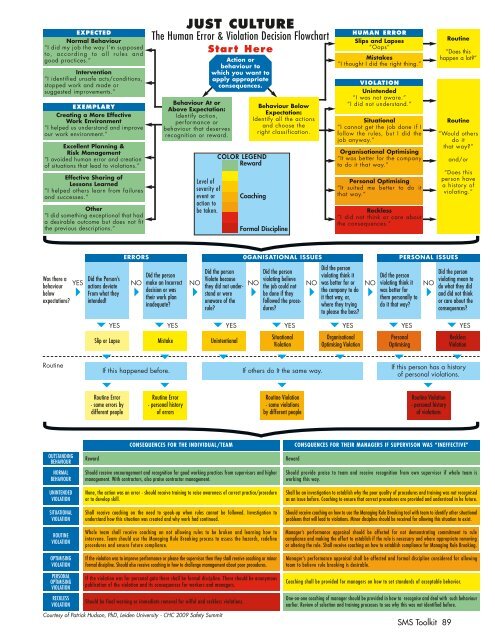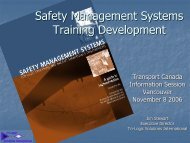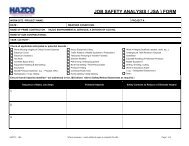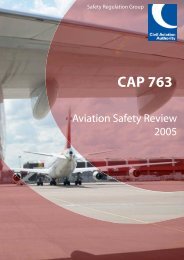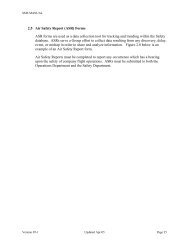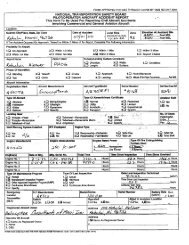International Helicopter Safety Team Safety Management System Toolkit
IHST - Safety Management Toolkit - Skybrary
IHST - Safety Management Toolkit - Skybrary
- No tags were found...
You also want an ePaper? Increase the reach of your titles
YUMPU automatically turns print PDFs into web optimized ePapers that Google loves.
EXPECTED<br />
Normal Behaviour<br />
“I did my job the way I’m supposed<br />
to, according to all rules and<br />
good practices.”<br />
Intervention<br />
“I identified unsafe acts/conditions,<br />
stopped work and made or<br />
suggested improvements.”<br />
EXEMPLARY<br />
Creating a More Effective<br />
Work Environment<br />
“I helped us understand and improve<br />
our work environment.”<br />
Excellent Planning &<br />
Risk <strong>Management</strong><br />
“I avoided human error and creation<br />
of situations that lead to violations.”<br />
Effective Sharing of<br />
Lessons Learned<br />
“I helped others learn from failures<br />
and successes.”<br />
Other<br />
“I did something exceptional that had<br />
a desirable outcome but does not fit<br />
the previous descriptions.”<br />
JUST CULTURE<br />
The Human Error & Violation Decision Flowchart<br />
Start Here<br />
Behaviour At or<br />
Above Expectation:<br />
Identify action,<br />
performance or<br />
behaviour that deserves<br />
recognition or reward.<br />
Level of<br />
severity of<br />
event or<br />
action to<br />
be taken.<br />
Action or<br />
behaviour to<br />
which you want to<br />
apply appropriate<br />
consequences.<br />
COLOR LEGEND<br />
Reward<br />
Behaviour Below<br />
Expectation:<br />
Identify all the actions<br />
and choose the<br />
right classification.<br />
Coaching<br />
Formal Discipline<br />
HUMAN ERROR<br />
Slips and Lapses<br />
“Oops”<br />
Mistakes<br />
“I thought I did the right thing.”<br />
VIOLATION<br />
Unintended<br />
“I was not aware.”<br />
“I did not understand.”<br />
Situational<br />
“I cannot get the job done if I<br />
follow the rules, but I did the<br />
job anyway.”<br />
Organisational Optimising<br />
“It was better for the company<br />
to do it that way.”<br />
Personal Optimising<br />
“It suited me better to do it<br />
that way.”<br />
Reckless<br />
“I did not think or care about<br />
the consequences.”<br />
Routine<br />
“Does this<br />
happen a lot?”<br />
Routine<br />
“Would others<br />
do it<br />
that way?”<br />
and/or<br />
“Does this<br />
person have<br />
a history of<br />
violating.”<br />
Was there a<br />
behaviour<br />
below<br />
expectations?<br />
YES<br />
<br />
Did the Person’s<br />
actions deviate<br />
From what they<br />
intended!<br />
ERRORS<br />
NO<br />
<br />
Did the person<br />
make an Incorrect<br />
decision or was<br />
their work plan<br />
inadequate?<br />
NO<br />
<br />
Did the person<br />
Violate because<br />
they did not understand<br />
or were<br />
unaware of the<br />
rule?<br />
0GANISATIONAL ISSUES<br />
NO<br />
<br />
Did the person<br />
violating believe<br />
the job could not<br />
be done if they<br />
followed the procedures?<br />
NO<br />
<br />
Did the person<br />
violating think it<br />
was better for or<br />
the company to do<br />
it that way, or,<br />
where they trying<br />
to please the boss?<br />
NO<br />
<br />
Did the person<br />
violating think it<br />
was better for<br />
them personally to<br />
do it that way?<br />
PERSONAL ISSUES<br />
NO<br />
<br />
Did the person<br />
violating mean to<br />
do what they did<br />
and did not think<br />
or care about the<br />
consequences?<br />
Routine<br />
YES YES YES YES YES YES YES<br />
Slip or Lapse<br />
Routine Error<br />
- same errors by<br />
different people<br />
Mistake<br />
If this happened before.<br />
Routine Error<br />
- personal history<br />
of errors<br />
Unintentional<br />
Situational<br />
Violation<br />
If others do It the same way.<br />
Routine Violation<br />
- same violations<br />
by different people<br />
Organisational<br />
Optimising Violation<br />
Personal<br />
Optimising<br />
<br />
Routine Violation<br />
- personaI history<br />
of violations<br />
Reckless<br />
Violation<br />
If this person has a history<br />
of personal violations.<br />
<br />
<br />
OUTSTANDING<br />
BEHAVIOUR<br />
NORMAL<br />
BEHAVIOUR<br />
UNINTENDED<br />
VIOLATION<br />
SITUATIONAL<br />
VIOLATION<br />
ROUTINE<br />
VIOLATION<br />
OPTIMISING<br />
VIOLATION<br />
PERSONAL<br />
OPTIMISING<br />
VIOLATION<br />
Reward<br />
CONSEQUENCES FOR THE INDIVIDUAL/TEAM<br />
Should receive encouragement and recognition for good working practices from supervisors and higher<br />
management. With contractors, also praise contractor management.<br />
None, the action was an error - should receive training to raise awareness of correct practice/procedure<br />
or to develop skill.<br />
Shall receive coaching on the need to speak-up when rules cannot be followed. Investigation to<br />
understand how this situation was created and why work had continued.<br />
Whole team shall receive coaching on not allowing rules to be broken and learning how to<br />
intervene. <strong>Team</strong> should use the Managing Rule Breaking process to assess the hazards, redefine<br />
procedures and ensure future compliance.<br />
If the violation was to improve performance or please the supervisor then they shall receive coaching or minor<br />
formal discipline. Should also receive coaching in how to challenge management about poor procedures.<br />
If the violation was for personal gain there shall be formal discipline. There should be anonymous<br />
publication of the violation and its consequences for workers and managers.<br />
Reward<br />
CONSQUENCES FOR THEIR MANAGERS IF SUPERVISON WAS “INEFFECTIVE"<br />
Should provide praise to team and receive recognition from own supervisor if whole team is<br />
working this way.<br />
Shall be an investigation to establish why the poor quality of procedures and training was not recognised<br />
as an issue before. Coaching to ensure that correct procedures are provided and understood in he future.<br />
Should receive coaching on how to use the Managing Rule Breaking tool with team to identify other situational<br />
problems that will lead to violations. Minor discipline should be received for allowing this situation to exist.<br />
Manager’s performance appraisal should be affected for not demonstrating commitment to rule<br />
compliance and making the effort to establish if the rule is necessary and where appropriate removing<br />
or altering the rule. Shall receive coaching on how to establish compliance for Managing Rule Breaking.<br />
Manager’s performance appraisal shall be affected and formal discipline considered for allowing<br />
team to believe rule breaking is desirable.<br />
Coaching shall be provided for managers on how to set standards of acceptable behavior.<br />
RECKLESS<br />
VIOLATION<br />
Should be final warning or immediate removal for wilful and reckless violations.<br />
Courtesy of Patrick Hudson, PhD, Leiden University - CHC 2009 <strong>Safety</strong> Summit<br />
One-on-one coaching of manager should be provided in how to recognise and deal with such behaviour<br />
earlier. Review of selection and training processes to see why this was not identified before.<br />
SMS <strong>Toolkit</strong> 89


